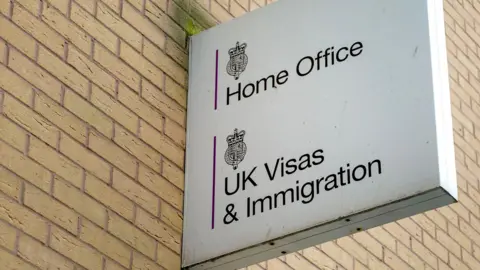 Getty Images
Getty ImagesA family of three, including a small child, are the first people to arrive in the UK under the government’s “one in, one out” agreement with France.
The BBC has been told they have been given three-month visas, with no right to work and no recourse to public funding. They can, however, apply to stay in the UK.
The move follows the removal of four migrants from the UK so far under the pilot scheme.
“This is a clear message to people-smuggling gangs that illegal entry into the UK will not be tolerated,” a Home Office spokesperson said.
“We will continue to detain and remove those who arrive by small boat.”
It is the latest development in the implementation of an agreement the government hopes will deter people from making the dangerous and illegal journey over the English Channel.
There is no suggestion from either the French or British governments that the plan will, on its own, smash the cross-channel trade.
Prime Minister Sir Keir Starmer is also seeking to dismantle criminal smuggling networks behind the crossings that the Home Office say “profit from human misery”.
However, the pilot has faced criticism from political opponents and rights groups.
Conservative shadow home secretary Chris Philp has previously said the government’s deal with the French would be less effective than the Rwanda plan proposed by the previous Tory government, and would offer “no deterrent effect whatsoever”.
The numbers returned so far were “pathetic”, he added.
The charity Asylum Matters, meanwhile, has argued that “the only way to stop people from making dangerous journeys is to give them real safe routes to seek sanctuary”.
The “one in, one out” scheme was announced in July.
Under the treaty, France agreed to take back migrants who had travelled to the UK by small boat and had their asylum claim withdrawn or declared inadmissible.
For each person returned to France, the UK will accept someone with a case for protection as a refugee who has not attempted to cross the Channel.
While this removal has been delayed, the government has been successful in sending four others to France who had arrived in the UK on a small boat.
Last week, an Indian national was the first person to be removed from the UK, followed days later by an Eritrean man, despite a legal bid to delay his departure.
Home Office sources said an Iranian male had also been returned to France, and later the department said an Afghan national had been returned.
However, the Home Office was refused permission on Tuesday to appeal against a temporary injunction blocking another Eritrean man from being removed.
In a last-minute reprieve, the High Court in London gave him at least 14 days to make representations to support his claim that he is a victim of modern slavery.
More than 30,000 people have crossed the Channel in small boats so far this year.
The total number of small boat crossings in the English Channel this year has dipped below record levels for the first time since 3 March, new government figures suggest.
In the year to 23 September, 32,188 people arrived in the UK by small boat, 148 fewer than at the same point in 2022.
French authorities say they have prevented more than 17,600 attempted crossings this year. But under maritime law, French officers say they cannot intervene once boats are in the water unless there is a threat to life.

